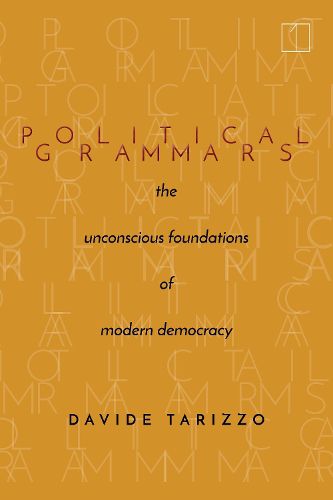Readings Newsletter
Become a Readings Member to make your shopping experience even easier.
Sign in or sign up for free!
You’re not far away from qualifying for FREE standard shipping within Australia
You’ve qualified for FREE standard shipping within Australia
The cart is loading…






Do we need to be a people, populus, in order to embrace democracy and live together in peace? If so, what is a populus? Is it by definition a nation? What exactly do we mean by nationality?
In this book, Davide Tarizzo takes up the problem of modern democratic, liberal peoples-how to define them, how to explain their invariance over time, and how to differentiate one people from another. Specifically, Tarizzo proposes that Jacques Lacan’s theory of the subject enables us to clearly distinguish between the notion of personal identity and the notion of subjectivity, and that this very distinction is critical to understanding the nature of nations whose sense of nationhood does not rest on any self-evident identity or pre-existent cultural or ethnic homogeneity between individuals. Developing an argument about the birth and rise of modern peoples that draws on the American Declaration of Independence of 1776 and the French Declaration of the Rights of Man and the Citizen of 1789 as examples, Tarizzo introduces the concept of political grammar -a phrase that denotes the conditions of political subjectification that enable the enunciation of an emergent we. Democracy, Tarizzo argues, flourishes when the opening between subjectivity and identity is maintained. And in fact, as he compellingly demonstrates, depending on the political grammar at work, democracy can be productively perceived as a process of never-ending recovery from a lack of clear national identity.
$9.00 standard shipping within Australia
FREE standard shipping within Australia for orders over $100.00
Express & International shipping calculated at checkout
Stock availability can be subject to change without notice. We recommend calling the shop or contacting our online team to check availability of low stock items. Please see our Shopping Online page for more details.
Do we need to be a people, populus, in order to embrace democracy and live together in peace? If so, what is a populus? Is it by definition a nation? What exactly do we mean by nationality?
In this book, Davide Tarizzo takes up the problem of modern democratic, liberal peoples-how to define them, how to explain their invariance over time, and how to differentiate one people from another. Specifically, Tarizzo proposes that Jacques Lacan’s theory of the subject enables us to clearly distinguish between the notion of personal identity and the notion of subjectivity, and that this very distinction is critical to understanding the nature of nations whose sense of nationhood does not rest on any self-evident identity or pre-existent cultural or ethnic homogeneity between individuals. Developing an argument about the birth and rise of modern peoples that draws on the American Declaration of Independence of 1776 and the French Declaration of the Rights of Man and the Citizen of 1789 as examples, Tarizzo introduces the concept of political grammar -a phrase that denotes the conditions of political subjectification that enable the enunciation of an emergent we. Democracy, Tarizzo argues, flourishes when the opening between subjectivity and identity is maintained. And in fact, as he compellingly demonstrates, depending on the political grammar at work, democracy can be productively perceived as a process of never-ending recovery from a lack of clear national identity.